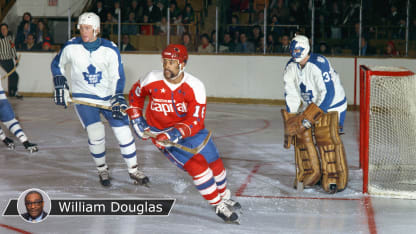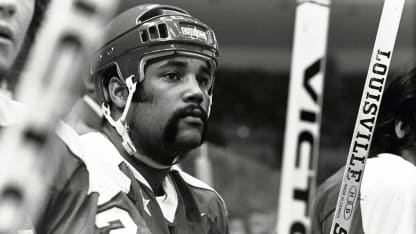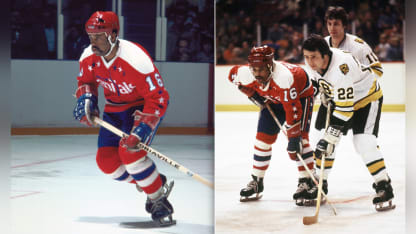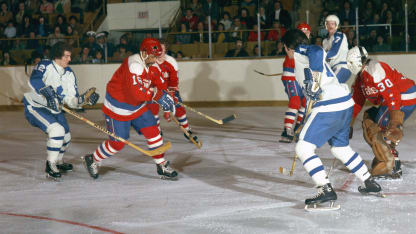"When I heard he got drafted, I thought it was fantastic," James said. "It was a giant leap, so I figured I had a chance."
James, a physical forward who was born in Ocala, Florida, and raised on Long Island, got his chance when the Red Wings made him the first Black American player to be chosen when they selected him in the 16th round (No. 184) in the 1977 NHL Draft. He played 11 games in the League with the Sabres and Toronto Maple Leafs from 1981-87.
Marson's NHL career was brief. As a 19-year-old rookie, he was the Capitals' third-leading scorer with 28 points (16 goals, 12 assists) in 76 games in 1974-75.
But Marson found playing on a team that went 8-67-5 in its first season was hard and being one of two Black players in the NHL -- undrafted forward Bill Riley joined Washington about three months into the season -- was harder.
With his Afro hairstyle jutting from his helmet, mutton chops, and a Fu Manchu mustache, Marson was targeted with racist taunts on and off the ice and received mailed death threats at his home and at the Capital Centre, Washington's first arena in Landover, Maryland.
"It was a culture shock," Marson told the Color of Hockey in 2016. "Nobody should have to make a comment that you're with the team to get on a plane; nobody should have to, when you get to the hotel, hear the staff ask the coach, 'Is this gentleman with you?' Or hear, 'We don't have people like him stay at our hotel'; and nobody should then have to go down in the morning for breakfast and have people usher by you nonstop because they won't serve you. This is before you even get to the rink, before you have to deal with your opposition. It was nonstop."
Marson played six seasons with the Capitals and Los Angeles Kings before he retired at age 25, with 48 points (24 goals, 24 assists) in 196 games.
But he left a lasting impact on the sport, said Anthony Stewart, a hockey analyst for Sportsnet and Hockey Night in Canada and former forward selected by the Florida Panthers with the No. 25 pick in the 2003 NHL Draft. He played 262 games with the Panthers, Atlanta Thrashers and Carolina Hurricanes from 2005-12.
A white jersey Marson wore in 1975-76 helps anchor a permanent exhibit at Capital One Arena that honors the 11 Black players in Capitals history.
Stewart named a mentorship group after Marson when he formed Hockey Equality, a nonprofit organization that partners with the NHL to help lower barriers to underserved hockey communities.
"It kept me level over the years just thinking about what Mike Marson had to go through, what's the math, nearly 30 years before I got drafted," Stewart said. "It gave me the strength to sort of carry on. He went through a lot of ups and downs and a lot of covert and overt racism.
"And for him to be at peace with that made it easier for players like me and others that he paved the way for to deal with what we have to deal with on a daily basis."





















